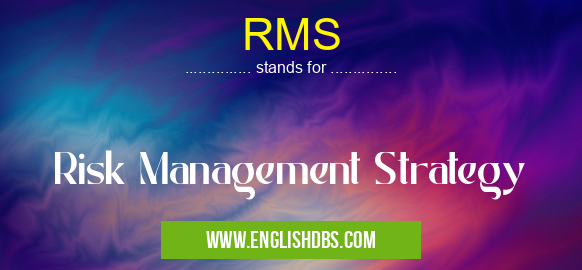What does RMS mean in MANAGEMENT
RMS (Risk Management Strategy) is a comprehensive framework that organizations implement to identify, assess, and manage potential risks. It aims to mitigate the impact of these risks on business operations, financial stability, and reputation.

RMS meaning in Management in Business
RMS mostly used in an acronym Management in Category Business that means Risk Management Strategy
Shorthand: RMS,
Full Form: Risk Management Strategy
For more information of "Risk Management Strategy", see the section below.
» Business » Management
Key Elements of RMS
- Risk Identification: Identifying and documenting potential risks that may affect the organization's objectives.
- Risk Assessment: Evaluating the likelihood and severity of identified risks to determine their potential impact.
- Risk Management Techniques: Implementing appropriate strategies to mitigate risks, such as risk avoidance, risk transfer, or risk acceptance.
- Risk Monitoring and Reporting: Regular monitoring and reporting of risk management activities to ensure ongoing effectiveness.
Benefits of RMS
- Improved Decision-Making: RMS provides a structured approach for leaders to make informed decisions by considering potential risks.
- Enhanced Risk Awareness: It raises awareness of risks throughout the organization, fostering a culture of risk consciousness.
- Reduced Financial Impact: By proactively managing risks, organizations can mitigate financial losses and protect their assets.
- Improved Reputation: Effective RMS reduces the likelihood of negative events that could damage the organization's reputation.
Essential Questions and Answers on Risk Management Strategy in "BUSINESS»MANAGEMENT"
What is a Risk Management Strategy (RMS)?
An RMS is a comprehensive plan that outlines how an organization will identify, assess, and mitigate risks to achieve its objectives. It provides a framework for making informed decisions and allocating resources to minimize potential losses and maximize opportunities.
Why is an RMS important?
An RMS enables organizations to:
- Protect assets and resources
- Reduce uncertainty and volatility
- Comply with regulations and industry standards
- Enhance decision-making and strategic planning
- Build resilience and adapt to changing environments
What are the key components of an RMS?
Key components include:
- Risk identification and assessment
- Risk mitigation strategies
- Risk monitoring and reporting
- Risk governance and oversight
- Risk communication and training
How is an RMS implemented?
RMS implementation involves:
- Establishing a risk management team
- Conducting a risk assessment
- Developing risk mitigation plans
- Implementing risk controls
- Monitoring and evaluating risk
What are the benefits of implementing an RMS?
Benefits include:
- Reduced financial losses
- Improved operational efficiency
- Enhanced reputation and stakeholder confidence
- Facilitated strategic planning
- Increased organizational resilience
How can I assess the effectiveness of an RMS?
Effectiveness can be assessed through:
- Regular monitoring and reporting
- Independent audits and reviews
- Performance metrics and key performance indicators (KPIs)
- Feedback from stakeholders
Final Words: RMS (Risk Management Strategy) is a critical component of modern business management. By implementing a robust RMS, organizations can protect themselves against potential risks, improve decision-making, and ensure long-term success.
RMS also stands for: |
|
| All stands for RMS |
